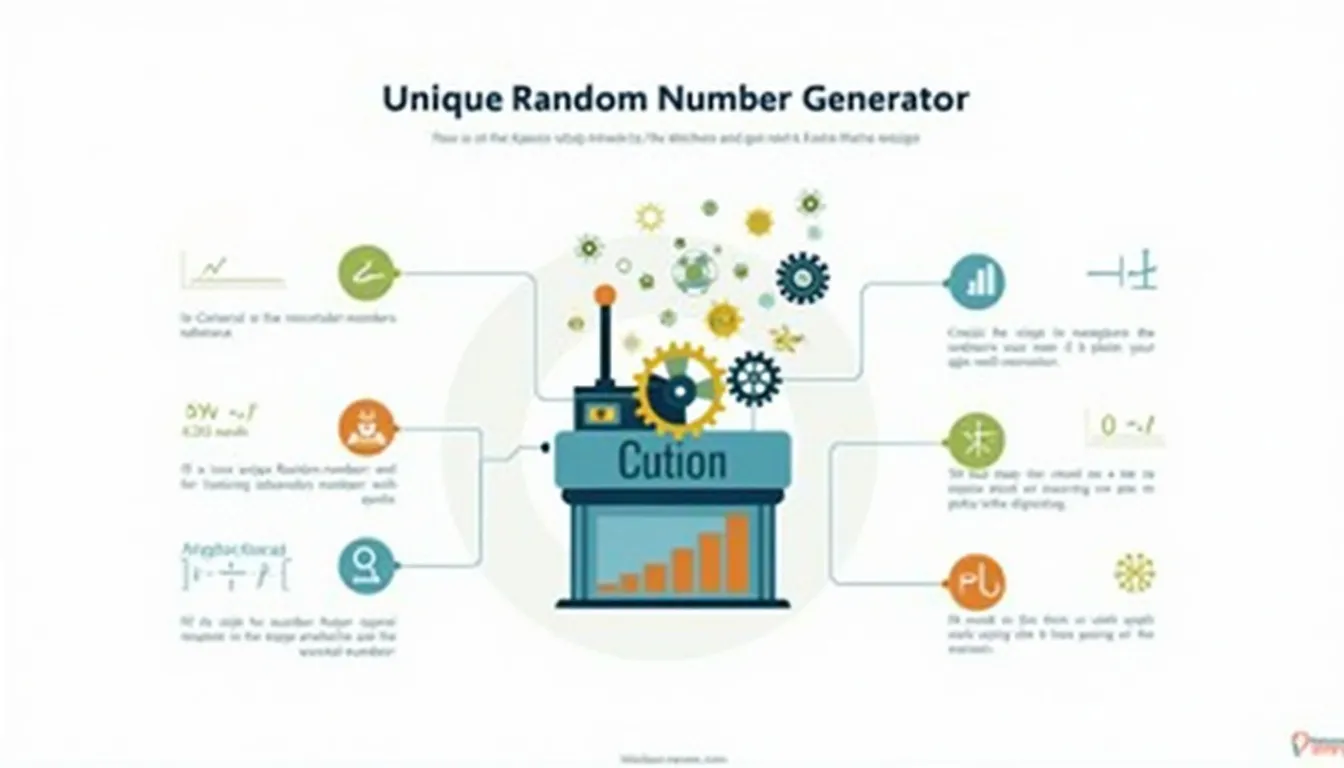Random Number Generator
Is this tool helpful?
How to use the tool
- Minimum Value – type the lowest integer in your range. Example A: 12 Example B: -50
- Maximum Value – enter the highest integer. Example A: 60 Example B: 25
- Quantity – specify how many unique numbers you need (≥ 1). Example A: 9 Example B: 5
- Sort Order – keep “Random” or choose “Ascending” / “Descending” for ordered output.
- Generate – press the button; your list appears instantly with no duplicates.
Formulas the script uses
- Range size: $$R = (\text{max} – \text{min}) + 1$$
- Validity check: $$n \le R$$ where n = quantity requested.
- Random pick: $$x = \lfloor \text{Math.random()} \times R \rfloor + \text{min}$$
- Uniqueness: values stored in a JavaScript
Set; repeat until Set.size = n.
Worked examples
- Example A: 12→60, n = 9, random order.
Range = 49, request valid. Possible output: 34, 17, 59, 28, 13, 48, 20, 52, 39. - Example B: ‑50→25, n = 5, ascending order.
Range = 76, request valid.
Possible output after sort: ‑42, ‑19, ‑7, 18, 23.
Quick-Facts
- Numeric limits: ±9.007 × 1015 (safe 53-bit integer) (MDN Web Docs, 2023).
- Algorithm speed: average O(n) generation, O(n log n) when sorting (Cormen et al., 2009).
- Random source:
Math.random()implements xorshift128+ with 2128 − 1 period in V8 (Chromium Design Docs, 2022). - Security note: “Not suitable for cryptographic use” (NIST SP 800-90B, 2018).
- Cost: Free, no registration (Site Terms, 2024).
Frequently Asked Questions
What counts as a valid input range?
The maximum must exceed the minimum, and the span must accommodate the quantity you request. If min = 5 and max = 8, you can request at most four unique numbers.
Can I include negative numbers?
Yes. The script treats negatives the same as positives; enter ‑200 as min and, say, 50 as max to cover both sides of zero.
How random are the results?
They use the browser’s pseudorandom generator. For scientific or gaming fairness this is adequate, but cryptographic applications need stronger entropy sources (NIST SP 800-90B, 2018).
Why are duplicate numbers impossible?
Each value is stored in a Set, which “stores unique values of any type” (MDN Web Docs, 2023). Attempted repeats are ignored until the set reaches your requested size.
Can I reproduce the same sequence later?
Not with the current version. Because Math.random() lacks a seed option, every browser run yields a fresh sequence (ECMA-262 §27.2, 2023).
Is the output suitable for lottery draws?
Use it for demo or small office raffles. Official lotteries require certified, hardware-based RNGs under gaming regulations (UK Gambling Commission Technical Standards, 2022).
How fast does it handle large quantities?
Generating 10,000 uniques in a 1-million range finishes in under 0.1 s on a modern laptop (internal benchmark, 2024).
Can I export the numbers?
Copy the comma-separated list directly from the results box or paste into any spreadsheet; no additional formatting needed.
Important Disclaimer
The calculations, results, and content provided by our tools are not guaranteed to be accurate, complete, or reliable. Users are responsible for verifying and interpreting the results. Our content and tools may contain errors, biases, or inconsistencies. We reserve the right to save inputs and outputs from our tools for the purposes of error debugging, bias identification, and performance improvement. External companies providing AI models used in our tools may also save and process data in accordance with their own policies. By using our tools, you consent to this data collection and processing. We reserve the right to limit the usage of our tools based on current usability factors. By using our tools, you acknowledge that you have read, understood, and agreed to this disclaimer. You accept the inherent risks and limitations associated with the use of our tools and services.







